PSYCHOLOGY OF ADOLESCENCE
advertisement
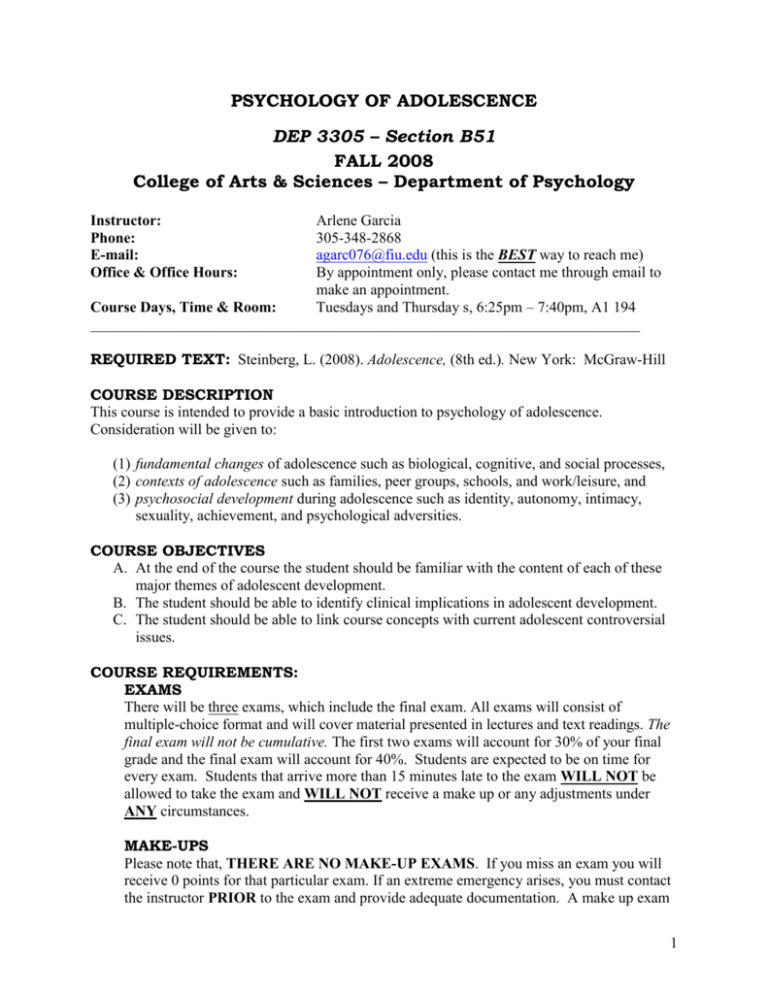
PSYCHOLOGY OF ADOLESCENCE DEP 3305 – Section B51 FALL 2008 College of Arts & Sciences – Department of Psychology Instructor: Phone: E-mail: Office & Office Hours: Arlene Garcia 305-348-2868 agarc076@fiu.edu (this is the BEST way to reach me) By appointment only, please contact me through email to make an appointment. Course Days, Time & Room: Tuesdays and Thursday s, 6:25pm – 7:40pm, A1 194 _________________________________________________________________________ REQUIRED TEXT: Steinberg, L. (2008). Adolescence, (8th ed.). New York: McGraw-Hill COURSE DESCRIPTION This course is intended to provide a basic introduction to psychology of adolescence. Consideration will be given to: (1) fundamental changes of adolescence such as biological, cognitive, and social processes, (2) contexts of adolescence such as families, peer groups, schools, and work/leisure, and (3) psychosocial development during adolescence such as identity, autonomy, intimacy, sexuality, achievement, and psychological adversities. COURSE OBJECTIVES A. At the end of the course the student should be familiar with the content of each of these major themes of adolescent development. B. The student should be able to identify clinical implications in adolescent development. C. The student should be able to link course concepts with current adolescent controversial issues. COURSE REQUIREMENTS: EXAMS There will be three exams, which include the final exam. All exams will consist of multiple-choice format and will cover material presented in lectures and text readings. The final exam will not be cumulative. The first two exams will account for 30% of your final grade and the final exam will account for 40%. Students are expected to be on time for every exam. Students that arrive more than 15 minutes late to the exam WILL NOT be allowed to take the exam and WILL NOT receive a make up or any adjustments under ANY circumstances. MAKE-UPS Please note that, THERE ARE NO MAKE-UP EXAMS. If you miss an exam you will receive 0 points for that particular exam. If an extreme emergency arises, you must contact the instructor PRIOR to the exam and provide adequate documentation. A make up exam 1 WILL NOT be provided. However, alternate arrangements may be made in cases where the student contacted the instructor prior to the exam and can provide adequate documentation for their extreme emergency. CLASS PARTICIPATION Participation is welcome and encouraged. Participation includes contributing knowledgeably to discussions. A few group rules are helpful, especially if the class is large. (1) Everyone has a chance to participate. Feel free to ask questions or join in. (2) No “side talk,” it is very distracting to people trying to listen or talk. (3) No “put-downs,” everyone is entitled to their opinion and deserves respect. TEACHING METHODS The teaching methods will consist of lectures and assigned text readings. ATTENDANCE AND SCHOLARLY CONDUCT Formal attendance in class is required, but it will not be policed. It is your responsibility to come to class, or to otherwise obtain information presented in class from another class member. To do well in this class, you will need to attend class lectures, as some of the material presented in class will not be found in your textbook. Students will be treated with respect and courtesy and I expect the same. In order to create an environment that is conducive to learning in a large lecture hall, it is critical that your in-class behavior contributes to a positive learning environment. Thus, behaviors that are disruptive will not be tolerated. ACADEMIC INTEGRITY Any student caught cheating on an exam will receive a grade of “F” for the course. Please refer to the university’s Code of Academic Integrity found in your student handbook for the disciplinary sanctions and procedures. OTHER CLASS POLICIES The university is committed to the principle that there shall be no differences in the treatment of persons because of race, creed, national origin, age, sex, or disability, and that equal opportunity and access to all facilities shall be available to all. Any student that may require special accommodations for this course should make this known to the instructor during the first week of class. COURSE GRADE The final grade for this course will be based on the average of three computer scored objective examinations, each covering approximately one third of the course content and the discussion presentation grade. The computer will calculate the total number of points each student receives for each exam as well as a frequency distribution for the entire class. The letter grade equivalent of a student's score on each exam will be based on the percentage of questions correctly answered using the following ranges: 2 A = 94% to 100% A- = 90% to 93% B+ = 87% to 89% B = 84% to 86% B- = 80% to 83% C+ = 77% to 79% C = 74% to 76% C- = 70% to 73% D+ = 67% to 69% D = 64% to 66% D- = 60% to 63% F = 0% to 59% *** UNIVERSITY DROP DATES *** SPRING 2008 SEMESTER: August 25th – December 13th Final Exam Week: December 8th – 13th September 2nd Drop/Add Period ends. Last day to complete late registration. Last day to drop courses or withdraw from the University without incurring a financial liability. October 17th Last day to drop a course with a DR grade. Last day to withdraw from the University with a WI grade. COURSE OUTLINE Disclaimer: This is a tentative course outline/schedule that is subject to change. Your understanding and flexibility are greatly appreciated. DATE 08/26/08 08/28/08 09/02/08 09/04/08 09/09/08 09/11/08 09/16/08 09/18/08 09/23/08 09/25/08 09/30/08 10/02/08 10/07/08 10/09/08 10/14/08 10/16/08 10/21/08 10/23/08 10/28/08 10/30/08 11/04/08 11/06/08 READINGS & TOPICS Introductions & Overview of Course Chapter 1: Biological Transitions (only pgs. 34-58) Chapter 2: Cognitive Transitions Chapter 3: Social Transitions Chapter 4: Families Chapter 5: Peer Groups Exam # 1: Chpts. 1, 2, 3, & 4 (Chapter 5 will not be on this exam) Chapter 6: Schools Chapter 7: Work & Leisure Chapter 8: Identity Exam # 2: Chpts. 5, 6, 7, & 8 Chapter 9: Autonomy Chapter 9: Autonomy Chapter 10: Intimacy 3 11/11/08 11/13/08 11/18/08 11/20/08 11/25/08 11/27/08 12/02/08 12/04/08 Week of 12/08/06 Chapter 10: Intimacy Chapter 11: Sexuality Chapter 11: Sexuality Chapter 12: Achievement Chapter 12: Achievement UNIVERSITY CLOSED: THANKSGIVING HOLIDAY! Chapter 13: Psychosocial Problems in Adolescence Exam 3:FINAL EXAM Chpts. 9, 10, 11, & 12 4
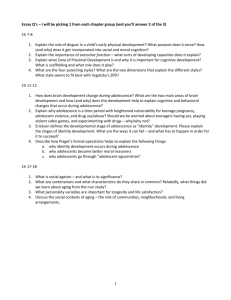
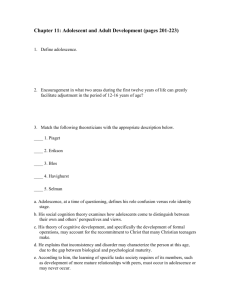
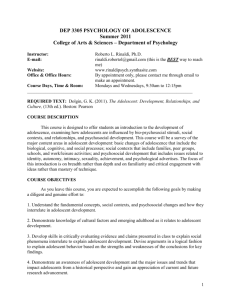
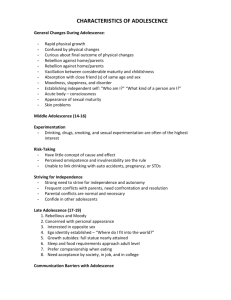
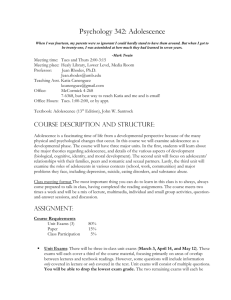
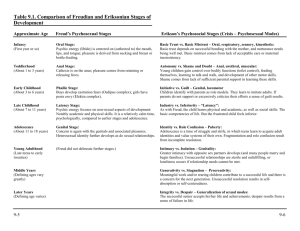
![Adolescence in 20th Century Literature and Culture [DOCX 16.08KB]](http://s3.studylib.net/store/data/006806148_1-4fb552dd69cbfa44b08b2f880802b1fe-300x300.png)